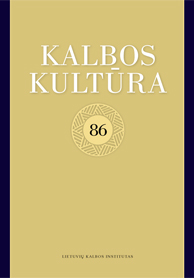Kaštai – vengtina svetimybė ar ekonomikos teorijos neišvengiamybė?
Kaštai – a barbarism to be avoided or an inevitability of economic theory?
Author(s): Ramunė VaskelaitėSubject(s): Baltic Languages
Published by: Lietuvių Kalbos Institutas
Keywords: loanword;barbarism to be avoided;meaning of the word;norm;use;term;concept;
Summary/Abstract: The article addresses a case of word use which is in disagreement to the codified norm – the use of the noun kaštas (English cost) in the economic language. Based on the analysis of the use of this word and the whole group of terms formed with it in the economic theory textbooks for higher education institutions as well as the treatment of the term in the dictionaries of economic terms, the article aims to find out the factors determining the contradiction between the norm and actual use.A rather varied evaluation of the noun kaštas in terms of norm in various dictionaries and standardising publications is considered one of such factors. Such norm variations is one of the factors of the spread of this word in the actual use, however, this loanword is special by its spread in a special area exclusively – economic theory. It means that the theory employs this word as a term for rendering a special meaning.The analysis of the texts on economic theory, revealing the meaning of the word kaštai as a term of economic theory, also unravels the reasons of the word’s insusceptibility to corrections: the proposed replacements išlaidos (expenses), lėšos (funds), sąnaudos (expenditure) do not render the meaning of the word; what is more, they are used in the same area in different meanings. The term išlaidos also separates the spheres of economic theory and accounting.Whereas a Lithuanian word rendering the specific meaning is lacking, the loanword is used. One of the factors in favour of the use of the loanword is also its spread in various languages, not only Polish, which was considered the source of arrival of this word in Lithuanian dialects. Contemporary interaction with other world languages shows that the word of this root is also used in other European languages. The loanword is also supported by the fact that economictheory is predominantly created in English and the arrangement of concepts in it has influence on the arrangement of Lithuanian concepts.On the other hand, the use of the term kaštai in the economic sphere is rather old. As the norm of this word tends to vary and it is being corrected from time to time, it has already established itself in the economic language and, in contrast to the new Anglicisms, it has been adapted in Lithuanian phonetically and morphologically. Its replacement would mean the reformation of the longestablished system of concepts in the science of economics; however, the majorproblem pertains to the fact that the replacements proposed to date do not render the meanings of this word in the economic theory. It should be up to the representatives of the economic theory, i.e. authors of new textbooks and compilers of the dictionaries of terms, to decide whether it is meaningful to search for new replacements or to support the long-established system of concepts.
Journal: Bendrinė kalba (iki 2014 metų – Kalbos kultūra)
- Issue Year: 2013
- Issue No: 86
- Page Range: 265-308
- Page Count: 44
- Language: Lithuanian

